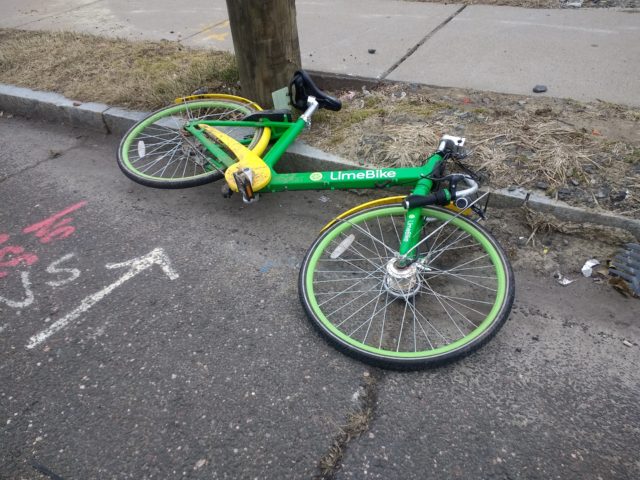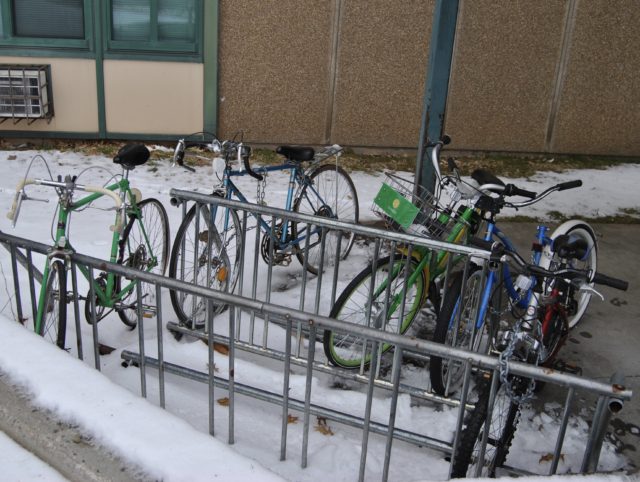
If you do not see Lime bikes out in Hartford this Spring, there are a few reasons why.
The City
The City of Hartford — meaning, the governing body — is a hotbed of inaction, taking too literally the “land of steady habits” slogan. There is a comprehensive bike plan that has yet to be released. Not a single mile of paint was striped for bike lanes in the last year. No bike infrastructure, period, has been added in the last year unless you count the installation of bicycle racks that have been in possession for at least a decade.
But wait, that’s not all! Lime, the bikeshare company, wanted to add electric scooters to the mix as we see in so many other medium-sized and major cities. A decision on that should have been made months ago. It wasn’t. The City Council takes far too long to move on anything, which is especially frustrating when it is known that they seemed both positive about e-scooters and would have been an influence on City departments.
Folks nervous about potential safety issues dragged their feet on the possibility when they could have formed an agreement that demanded crash data from Lime or even stipulated that if more than a certain percentage of users experienced injuries, the scooters would have to go. This is particularly astounding when one knows enough about data to understand that cars, not electric scooters, pose the greatest risk by far. The scooters have headlights, brakes, bells, and speed limiters. Instead of finding a smart and reasonable way to proceed with progress, even if on a trial basis, the City dropped the ball once again. An agreement on electric scooters would have more likely secured the arrangement with Lime to continue supplying dockless rental bikes in Hartford.
The Users
The blame does not sit solely with those risk averse people in power.
Hartford has set new records for number of Lime bikes stolen. An exact number is not available, but it’s likely somewhere between 300 and 1000. If in the last few months you’ve seen the bikes out in the Hartford area, those are stolen bikes. . . maybe not by the person riding them, but at some point along the line.
It makes no financial sense for a private company to continue investing in a place that has cost them probably in the vicinity of $100,000-$350,000. You break your toys, you get no toys to play with.
The Company
Their initial rollout of bikes in Hartford was flawed. For a few days it was possible to get that first free ride without registering a debit or credit account. This allowed for theft because there was no way to hold these individuals accountable for not returning the bikes. Although Lime caught this error and fixed it, much loss happened early on.
Another thing Lime could have done differently was to get a company representative to do outreach to the neighborhoods several months before the bikes were dropped here. There needed to be better education as to this day there are folks who believe these bicycles are “government bikes.” Granted, it is difficult to get word out to everybody in Hartford, but a better effort upfront would likely have helped people understand that Lime is a private company that can leave at any time.
Finally, their bicycle locks were simply too easy to break. A child with a rock could smash them. Their scooters have a locking mechanism that renders them useless, and there has been talk of their next wave of bikes using a similar, harder-to-break system, but at this point if we want to experience that, we will have to travel outside the region to cities where Lime has found a more receptive market.
The City did the right thing by trying out bikeshare, but needs to learn from this experience if it wants to truly be creative and innovative.
J. Stan McCauley
Creativity and innovation require an administration that is creative and innovative. Change in the land of steady habitats will require voters to actually do some heavy lifting and know something about the people they are voting for.
Erik
🤦🏻♂️
Richard Nelson
I had to laugh at the line, “Hartford has set new records for the numbers of Lime Bikes stolen.” Months ago I said to you how easy it was even for a older gentleman such as myself to break the lock on that bike and ride away, repaint it and have a nice bike. Stealing may be wrong but if I don’t have any money honey, and no way to get around I would take a bike. Of course everyone, please have no fear of me riding a bike anywhere as myself driving any type of wheels would be a mini disaster. Did those bikes have any type of bell or horn to warn us walkers when a bike is approaching on the sidewalk? I thought the whole idea was a odd to begin with.
Tony C
Richard – Those Lime bikes definitely had bells. Curiously the bells were very popular, and caused others to come by BiCi Co. to buy bells for their personal bikes. The bikes also had lights and working brakes, which are missing on way to many personal bikes in Hartford.
Bill Doak
It was a good idea, but another good idea would have been to set up a tracking mechanism inside the tube frame of each bike so that the piles of Limebikes that i have seen behind houses and tossed along the streets and byways could be recaptured and repaired quickly by Limebike staff. Days went by with the bike sitting by – or laying across – a sidewalk In East Hartford. What should East Hartford residents have done? Where was the communications and information outside of the city of Hartford about this program?
Kerri Provost
Bikes did have tracking mechanisms, but these were sometimes broken off. Bikes in this program were allowed outside of Hartford. Theoretically, if a bike sat in one place for a few days, staff would retrieve and recirculate.
suzann beckett
That’s a shame. It was a great idea, but the lack of bike lanes in this City is a huge problem. The few that exist start and stop with no rhyme or reason, so that regularly using a bike for transportation is virtually impossible. With today’s snow and parking ban, it’s easy to visualize how wide many of our streets really are – with some creativity and car parking limited to just one side of the street, we definitely have room for bikes too.
SB Chatterjee
This post was disheartening to read. The article points to failures in policy and infrastructure that would have made LimeBikes grow in Hartford to be a success. There is another element that needs to be considered – LimeBike was a private venture. They are entrepreneurs who took the risk in bringing their innovation to Hartford and along with it – taxes and jobs that the city desperately needs (see link below).
LimeBike is expanding in 58 cities after massive Uber partnership
https://media.thinknum.com/articles/limebike-is-hiring/
Kerri Provost
It was disheartening to observe this loss happen and to write about it.
Lime and other bike share companies have done well elsewhere, as you’ve noted.
Colleen
Excellent article. Valid point re education.
Further, as many have mentioned online, consistent bike paths, better tracking, locks, safety, etc, grt ideas.
Since the new plan is already underway, I doubt in Hartford anyone will consider this suggestion, but one can hope.
Long before TELLING citizens what to do, proponents might have been wellserved to build buy-in from neighborhoods, ACTUALLY ASKING people in groups at churches, community centers, schools, colleges, after school programs, what they might envision in all of hartfords neighborhoods. Ask for representatives from these meeting to further bring forward neighborhood questions and ideas.
Admittedly, this kind of work takes a long time and can be slow and challenging. especially when there are opportunities to launch a project.
A citywide sense of project ownership and pride, may have helped the program succeed or mitigated losses.
Once buy-in is achieved, involve EVERYONE in education, including youth, seniors, , families, the sometime casual cyclist as well as the full on bike enthusiast, the less than fit person who wants to bike as well as the uber fit cyclist who wears the uniform.
And buy-in may not be achieved, but there would certainly be a stronger sense from the start how well a project might be supported.
Another thing to consider re: expanding bike paths, map out major destinations in neighborhoods, between towns, eg, grocery store, banks, major employers, care centers, what are the major routes?
Involve local universities and state. What about a bike path via local routes to PW? Cigna? Hartford to Simsbury? to UCONN Health in Farmington?
Additionally, how about collaboration between Hartford and West Hartford? East Hartford? A bike path between the West Hartford reservoir and Downtown Hartford, would ne lovely. Even between WH center anddowntown. Starting in North neighborhoods, Paths all up and down Main St thru Wethersfield Ave. Bike path Albany Ave from Uha thru to Main. Takes serious plannng.
Work with DMV and legislature to increase penalty for failure to yield.
Consider not everyone will have a smart phone. Make it possible for public schools to have a free bike sharing system.
Involve youth at all levels of planning and implementation. Not just handoucking friends, but ask for volunteers.
Propose bike racks at all educational institutions , incl. universities, and public schools, eg UHA, Uconn law, CCC, Uconn downtown,
For any successful project,
Ownership and buy-in are key. Great effort and idea, but might have been strongly perceived as very much “top-down” which might have impacted losses and potential for success.
Colleen
Sorry, the ipad likes to change my spelling, The above should read, “not just handpicking friends” referencing brining youth into the planning and implementation process.
Thanks.